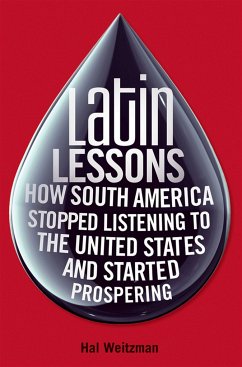The mistakes the United States has made in Latin America--and the high price it will pay for them Could it be that for the first time in history, the United States needs Latin America more than the other way round? Since the early 1800s, the United States regarded the region as its "backyard," but in the past decade South America's leaders have increasingly snubbed US efforts to persuade them to adopt free-market economics and sign trade agreements. While Washington has been distracted by military campaigns elsewhere, rivals such as China, Russia, and Iran have expanded their clout in Latin America, and US influence in the region has fallen to a historic low--at the very time that the United States has become more dependent than ever on exporting to Latin America and importing its oil. Combining sharp wit and great storytelling with trenchant analysis, Hal Weitzman examines how America "lost the South" and argues that if the United States is to find a new role in a world of emerging superpowers, it must reengage with Latin America. * Charts the rise of resource nationalism--in which governments take increasing control of natural resources and squeeze multinational corporations--in South America and across the world * Illustrates analytical points with vivid stories--such as the disappearance of the Panama hat or the sweater Evo Morales wore throughout a world tour--and interviews with presidents, policymakers, and protesters * Written by a Financial Times journalist who formerly served as its Andes correspondent based in Lima, Peru
Latin Lessons In recent years, the U.S. economy has fallen on hard times, with persistently high unemployment, stagnant wages, and a fast-expanding national debt burden. At the same time, South America has been booming, with rapid economic growth, falling unemployment rates, and decreasing indebtedness. Is it possible that instead of telling Latin America what to do, the U.S. should be following their lead? In Latin Lessons, Financial Times correspondent Hal Weitzman explains how, after many decades of destructive political and military interference and disastrous economic and trade policies, many South American countries have had enough of the American way of doing things. Thanks to demand from big emerging economies, which has caused commodity prices to surge and cash to flow into the continent, most South American governments have become increasingly "resource nationalistic" and have ramped up social spending to meet the needs of the poor and the indigenous, causing poverty levels to drop--at the same time as poverty has been on the increase in the United States. Over the past ten years, Weitzman reveals, most of South America has been turning away from Western-style globalization and toward more resource nationalism. Previously impoverished Latin American states such as Peru and Bolivia have found eager partners in the emerging economic powers of China and India--which are willing to pay a premium for oil, metals, and agricultural commodities--as well as Russia and Iran. While the U.S. military is deeply concerned about Iranian involvement, especially with Hugo Chávez's Venezuela, it is the widespread, vast, and growing commercial presence of China that is eroding America's dominance in the region. Weitzman punctuates his trenchant analysis with sharp wit and remarkably entertaining and revealing stories. He traces a path from the hilarious flap over Bolivian president Evo Morales's fondness for a red, white, and blue sweater to the broader themes of South American nationalism, the transfer of power from elites to populist leaders, and governments' increasing focus on the needs of the poor rather than the demands of the wealthy. This puts them in direct opposition with policies the United States has been advocating for decades. Is the United States doomed to continue losing influence in Latin America? Will China soon come to dominate the area both commercially and strategically? Can America find a way to do business with countries from Mexico to Argentina without interfering in their internal affairs? Read Latin Lessons and find out. "Trenchantly expressed, furiously paced, masterfully informed, and utterly persuasive, Hal Weitzman's book shows how the U.S. urgently needs a new partnership with Latin America, and exposes the frustrations of recent and current failures. Everyone in the foreign policy establishment should read it." --Felipe Fernández-Armesto, author of Pathfinders: A Global History of Exploration and The Americas: A Hemispheric History "A balanced, very readable, and often insightful guide to the revolutionary changes sweeping through many parts of Latin America. He is certainly right that these trends will profoundly affect the ability of the United States to adjust to its postimperial status. We North Americans ignore them at our peril." --Jeff Faux, author of The Global Class War "A level-headed look at a critical region, as befits a former Financial Times Andean correspondent. In this engagingly written work, Hal Weitzman skillfully probes the causes and consequences of South America's shift away from its northern neighbor, drawing on meticulous research and his own extensive experience in the region. Weitzman challenges conventional conceptions of our hemispheric neighbors, and proposes a new approach for U.S. policy." --Thomas F. "Mack" McLarty III, former White House chief of staff and Special Envoy for the Americas for President Bill Clinton
Hinweis: Dieser Artikel kann nur an eine deutsche Lieferadresse ausgeliefert werden.
Latin Lessons In recent years, the U.S. economy has fallen on hard times, with persistently high unemployment, stagnant wages, and a fast-expanding national debt burden. At the same time, South America has been booming, with rapid economic growth, falling unemployment rates, and decreasing indebtedness. Is it possible that instead of telling Latin America what to do, the U.S. should be following their lead? In Latin Lessons, Financial Times correspondent Hal Weitzman explains how, after many decades of destructive political and military interference and disastrous economic and trade policies, many South American countries have had enough of the American way of doing things. Thanks to demand from big emerging economies, which has caused commodity prices to surge and cash to flow into the continent, most South American governments have become increasingly "resource nationalistic" and have ramped up social spending to meet the needs of the poor and the indigenous, causing poverty levels to drop--at the same time as poverty has been on the increase in the United States. Over the past ten years, Weitzman reveals, most of South America has been turning away from Western-style globalization and toward more resource nationalism. Previously impoverished Latin American states such as Peru and Bolivia have found eager partners in the emerging economic powers of China and India--which are willing to pay a premium for oil, metals, and agricultural commodities--as well as Russia and Iran. While the U.S. military is deeply concerned about Iranian involvement, especially with Hugo Chávez's Venezuela, it is the widespread, vast, and growing commercial presence of China that is eroding America's dominance in the region. Weitzman punctuates his trenchant analysis with sharp wit and remarkably entertaining and revealing stories. He traces a path from the hilarious flap over Bolivian president Evo Morales's fondness for a red, white, and blue sweater to the broader themes of South American nationalism, the transfer of power from elites to populist leaders, and governments' increasing focus on the needs of the poor rather than the demands of the wealthy. This puts them in direct opposition with policies the United States has been advocating for decades. Is the United States doomed to continue losing influence in Latin America? Will China soon come to dominate the area both commercially and strategically? Can America find a way to do business with countries from Mexico to Argentina without interfering in their internal affairs? Read Latin Lessons and find out. "Trenchantly expressed, furiously paced, masterfully informed, and utterly persuasive, Hal Weitzman's book shows how the U.S. urgently needs a new partnership with Latin America, and exposes the frustrations of recent and current failures. Everyone in the foreign policy establishment should read it." --Felipe Fernández-Armesto, author of Pathfinders: A Global History of Exploration and The Americas: A Hemispheric History "A balanced, very readable, and often insightful guide to the revolutionary changes sweeping through many parts of Latin America. He is certainly right that these trends will profoundly affect the ability of the United States to adjust to its postimperial status. We North Americans ignore them at our peril." --Jeff Faux, author of The Global Class War "A level-headed look at a critical region, as befits a former Financial Times Andean correspondent. In this engagingly written work, Hal Weitzman skillfully probes the causes and consequences of South America's shift away from its northern neighbor, drawing on meticulous research and his own extensive experience in the region. Weitzman challenges conventional conceptions of our hemispheric neighbors, and proposes a new approach for U.S. policy." --Thomas F. "Mack" McLarty III, former White House chief of staff and Special Envoy for the Americas for President Bill Clinton
Hinweis: Dieser Artikel kann nur an eine deutsche Lieferadresse ausgeliefert werden.








